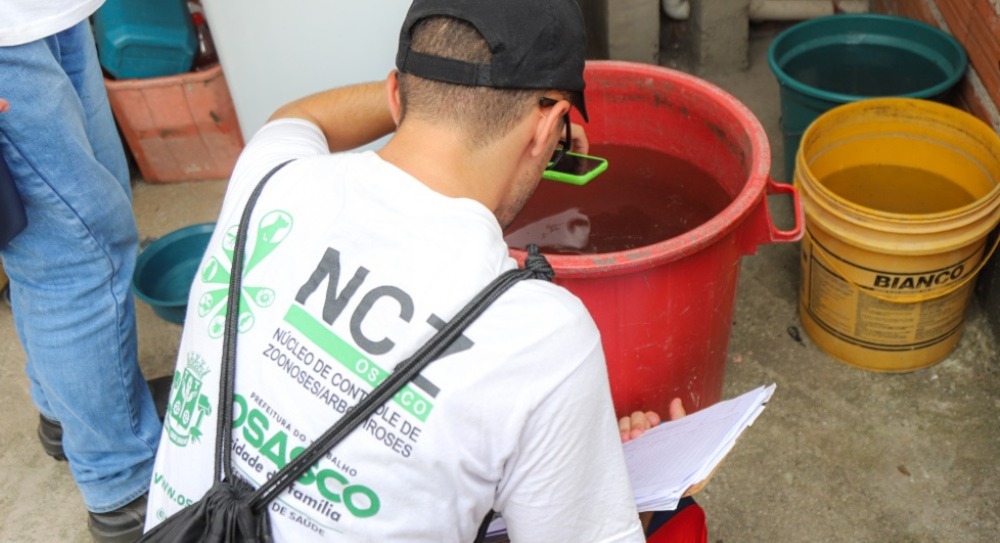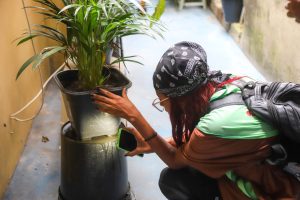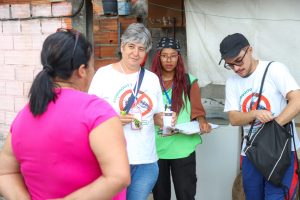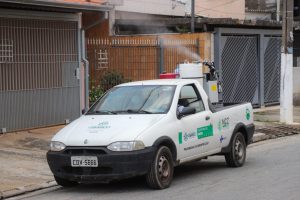text: Olga Liotta
Pictures: Fernanda Casarini
Dengue control work in Osasco is carried out daily by endemic disease agents in the City Council Health Department. They visit homes and scan environments to find potential spreads for Aedes aegypti, the mosquito that transmits dengue, Zika, and Chikungunya.
Whoever thinks that it is enough to put sand in the dishes of plants is mistaken. The procedures include all areas of residences, schools, companies, workplaces, rubber shops, and others.
Any corner can become a breeding ground and knowing the risks well and knowing what measures to take to combat dengue is the duty of every citizen. In just three days, after contact with water, the eggs turn into larvae and become adults less than a week later.
Care is simple, but it makes a difference, and it boils down to getting rid of any standing water tank, whether clean or dirty, explains the endemic worker, Guilherme K. Alcântara.
“Every week the resident must sweep and check places where standing water can accumulate. Always keep water tanks, gallons, barrels, drains, and trash cans well covered, clean gutters, cap tires, turn empty bottles upside down, whether glass or pet, cover swimming pools, clean out refrigerator drawers, clean pet bowls, eg For example, it inhibits the reproduction of the Aedes aegypti mosquito.
In addition to the technical visit, larvicide applications, sprays in the neighborhoods with the highest frequency of mosquitoes, there is also a rodent control service on public roads. All work is supervised by the Technical Supervisor of the Center for Zoonoses Control, Eduardo Bispo dos Santos, and the Director of the Department of Zoonoses Control, Adhemar Mazzola. Each inspection is included in the monitoring and monitoring bulletins.
Iracene P. Duques, a resident of Mutenga for over 30 years, called 156 and asked for a neighborhood endemic team. My family and I have already had dengue and chikungunya. We are always on alert. This measure is very beneficial for us, the community and the neighborhood,” he commented.
“It is an ongoing work of awareness. We direct, show the care to be followed and ask for people’s cooperation to eliminate potential Aedes aegypti breeding sites. We work on prevention and reduce the number of cases of the disease in the municipality, ”promotes the coordinator of the nucleus for zoonoses control, Enoque Luz.
Keeping the city clean also contributes to combating the spread of Aedes aegypti and flooding. Therefore, it is important that residents do not throw garbage on the streets. In addition to the street sweeping service carried out daily by teams from the Services and Works Department, the City Hall also removes debris, tires, construction debris, furniture, and rubbish that is dumped into streams and streets in an erratic manner.
The illegal dumping of rubbish on public roads is an environmental offense and, if caught in the act, can result in a fine. (Federal Law No. 9.605 / 1998).
If a citizen needs the free service of removing this waste, it is necessary to make an appointment in advance at Central 156 (or 3651-7080 / WhatsApp), which is open 24 hours a day.
The city also has Ecopoints, which receive waste such as leftovers from civil construction, old furniture, wood, paper, cardboard, metal, plastic, glass, and more.
Check addresses:
Ecopoints:
Erdem Motenga – Avenida nix, 783
Novo Osasco – Rua Theodoro de Souza Brandao 1020
Jaguarbi – Rua Fernando Meulen Filho, 150
Helena Maria – Rua Bellarmino Alves da Silva, Corner with Rua Walt Disney
Mini Ecopoints
Adalgisa – Rua Octávio Catelani, s / nº, corner with Rua Rui Alvarenga
Flags – Rua João Guimarães Rosa, 220
Monther Jr. – Rua Erva Cedrera, High No. 80
Sponsor – Avenida Benedetto Alves Toribio, Corner of Avenida João Paulo II

“Wannabe internet buff. Future teen idol. Hardcore zombie guru. Gamer. Avid creator. Entrepreneur. Bacon ninja.”




